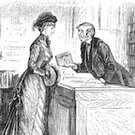Author: Mrs. Pemberton
Author: Mrs. Pemberton (1830–1877)
Alternate Name(s): (pseudonym); H. Pemberton (pseudonym); Helen Etough Crookshank (maiden name); Gipps (married name); Hume (alternate name); Dick (alternate name)
Biography: One of the minor mysteries of Victorian authorship. Helen Etough Gipps was born in 1830 in France, the only daughter of the Rev. George Crookshank, the vicar of Chigwell, Essex, and Amel Rosa Kelly. Through her mother, she was the niece of attorney-general Sir Fitzroy Kelly (1796–1880) and grand-daughter of novelist Isabella Kelly (1759–1857). After her father's death in 1833, her mother married Edwin Taynton, a captain in the Indian service who died in action in 1845. In 1851, Gipps married Augustus Pemberton Gipps, the secretary of the patent department of the Kensington Museum. Though the marriage began with affection, the couple briefly separated after the birth of a daughter Clara Fitzroy Gipps in July 1852. They reunited and traveled on the continent where their son Alexander George Pemberton Gipps was born in September 1854. Thereafter, husband and wife separated for good and Helen lived alternately with her mother in London and her brother in the country. During this period, she met the Right Honorable William Wentworth Fitzwilliam Hume (1806–1892): he was a widower (since 1837), hugely wealthy (having inherited two million pounds from his uncle), and the conservative M.P. of Wicklow. (In 1864, Hume legally changed his name to "Hume Dick.") The two began an affair which her husband discovered in November 1860 and he petitioned for divorce the following spring. During the trial, Hume offered Gipps £3000 to quash the case and a further £4000 to be paid later. Gipps accepted and the divorce case was found in favor of Helen. When the second payment failed to materialize, Gipps sued Hume in court (which failed) and petitioned again for divorce in 1862. In the meantime, Helen gave birth to twin daughters, Helen Amelrosa and Williamina Emily Hume Dick (thereby confirming her adultery). The judge in the second divorce proceeding ruled adultery had occurred but Gipps connived with the adultery by accepting the money in the first trial and by failing to take back his wife. Gipps appealed to the House of Lords who affirmed the decision in 1864. (There is no evidence if Augustus and Helen ever legally divorced.) In the 1860s, supported no doubt by Hume, Helen divided her time between London, Thames Ditton, and Combe Royal (in Devon) and she began writing novels with The World's Furniture (1861). She followed with a further six triple-deckers, the last, Will is the Cause of Woe (1878), was published posthumously. None of her novels made much mark with the public or critics. In addition, she wrote one travel book, A Winter Tour in Spain (1868). Helen, due to the scandal perhaps, went by various surnames: Pemberton (her pseudonym), Hume, and Dick (though she never married Hume). She died in 1877 in London. Her twin daughters survived their mother's scandal: both were presented at court and both married well. Note on the identification: Wolff owned presentation copies of the novels from the author to her daughter Williamina Hume Dick (these copies are located at the Harry Ransom Center). Presentation copies from the author to her daughter Helen Hume Dick are located at the Baillieu Library.
References: British Census (1871); Turtle Bunbury, "Humewood Castle," (http://www.turtlebunbury.com/history/history_houses/hist_hse_humewood.html); pers inf (Turtle Bunbury); "Court for Divorce," Times (22 January 1863); Wolff
Fiction Titles:
- The World's Furniture: A Novel. 3 vol. London: C. J. Skeet, 1861.
- Altogether Wrong. 3 vol. London: Tinsley Brothers, 1863.
- What Money Can't Do: A Novel. 3 vol. London: Tinsley Brothers, 1866.
- Dacia Singleton. 3 vol. London: Tinsley Brothers, 1867.
- Madame la Marquise: A Novel. 3 vol. London: Tinsley Brothers, 1871.
- The Only One of her Mother: A Novel. 3 vol. London: Tinsley Brothers, 1874.
- Will is the Cause of Woe. 3 vol. London: Samuel Tinsley, 1878.
